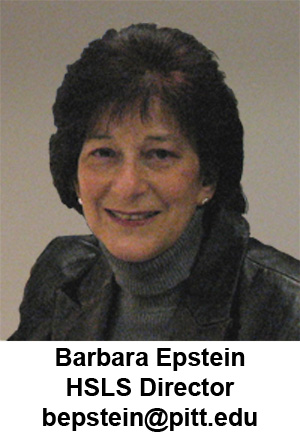 As the vanguard of the baby boomer generation becomes eligible to apply for Medicare in 2011, a significant percentage of librarians will retire in the next five to ten years. HSLS is deeply committed to development of the next generation of health sciences librarians, and we contribute to that effort in many ways.
As the vanguard of the baby boomer generation becomes eligible to apply for Medicare in 2011, a significant percentage of librarians will retire in the next five to ten years. HSLS is deeply committed to development of the next generation of health sciences librarians, and we contribute to that effort in many ways.
Each year we offer work experience to one or more students earning MLIS degrees at Pitt through the iSchool’s Partners Program. Students earn partial tuition scholarships while gaining practical library skills. We also host students for semester internships.
Since 2000, we have partnered with the School of Medicine’s Department of Bioinformatics on a yearlong Traineeship in Health Sciences Librarianship and Biomedical Informatics, funded by the National Library of Medicine. One or two Trainees each year earn a Certificate in Biomedical Informatics, gain library experience and complete an applied research project. Several former Fellows are employed as HSLS faculty librarians, while others work at institutions such as the Rand Corporation, Carnegie Mellon University, the University of Southern California, and the University of Maryland.
In partnership with Pitt’s iSchool, we’re funded by a large grant from the federal Institute of Museum and Library Services to develop an online 15-credit post-master’s Certificate in Health Sciences Librarianship. HSLS librarians serve as the faculty, and as an added benefit, have gained new skills in online instruction. The first cohort of 12 students from around the country has begun the final term of study. The program will end with a capstone event in May 2011 in conjunction with the annual meeting of the Medical Library Association (MLA) in Minneapolis. Each student submitted their applied research project as a poster presentation at MLA, and 100% of the proposals were accepted! The application process is underway for the second cohort to begin in May 2011.
This year, I’m participating in leadership development in a very personal way as a mentor for the joint Leadership Fellows Program of the National Library of Medicine and the Association of Academic Health Sciences Libraries. This is a targeted program to prepare emerging leaders for director positions in academic health sciences libraries. During the yearlong program, the cohort of five mentor-fellow pairs participate in a variety of learning settings, including in-person leadership institutes, attendance at an Association of American Medical Colleges (AAMC) annual meeting, and a virtual curriculum on issues of library leadership. The fellows also visit their mentor’s home library, gaining exposure to leadership in another environment. I am paired with Kelly Gonzalez, deputy director at the University of Texas Southwestern Medical Center Library, who will visit HSLS in March 2011.